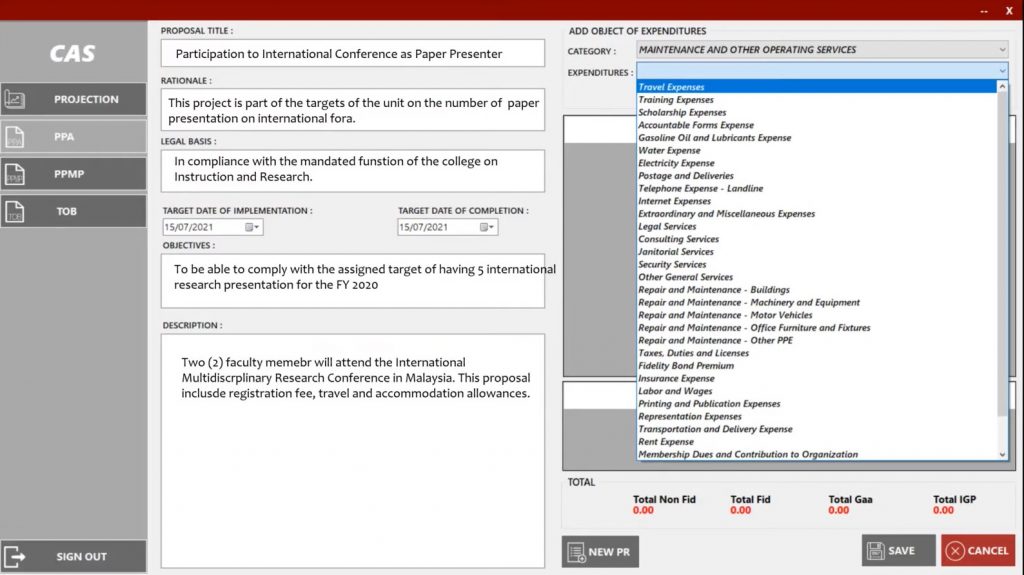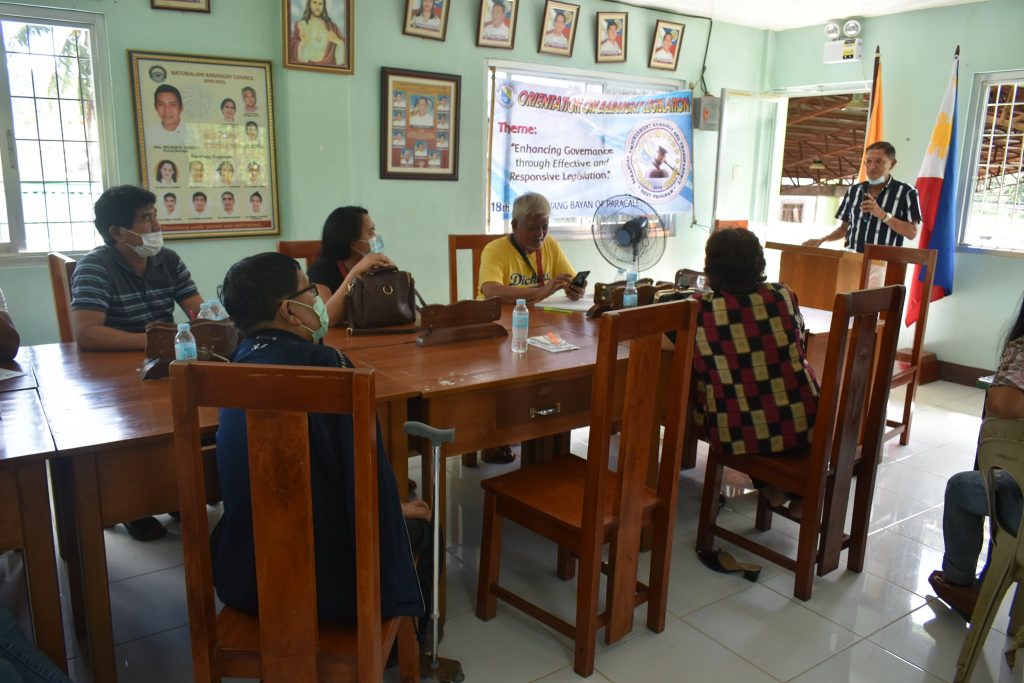Organization
Camarines Norte State College
Best Practice Focus Area/s
Strategy; Measurement, Analysis, and Knowledge Management; Operations
Year Implemented
9 January 2018
This is a Recognized Best Practice
Summary
This project/system provides a solution to the current concerns of Camarines Norte State College System in its “budget-planning” process and reporting system. It aims to prevent non-conformity to the requirements of interested external parties like the NEDA, CHED, and DBM. Initially, the system was used by the Institutional Planning and Development Office (IPDO) in the budget-planning process to promote ease, accuracy, and timeliness in the preparation of budget reports. In the development process, ease of use and accuracy were among the factors that were hypothesized to affect the timeliness and directly correlate with productivity.
The project started in the Institutional Planning and Development Office, which is responsible for consolidating budget plans of the Nine (9) delivery units of the CNSC system. Today, the eBPPro is being used by these delivery units in their respective budget preparations. The E-BPPro has ensured the alignment of the budget to the institutional development plans, the performance indicators set by CHED, and the requirements of DBM. With this, CNSC was able to meet the Budget Utilization Target, and in 2019, it qualified for the Performance-Based Bonus (PBB) after several years of non-compliance. The e-BPPro is now being reprogrammed to make it available to other State Universities and Colleges for their budget planning activities.
Background and Problem
Since the creation of Camarines Norte State College, the budget planning process has been conducted traditionally. The budget proposal was constantly subjected to changes and modifications, and the budget process usually takes six (6) to eight (8) months before getting finalized. Because of ceaseless modifications, the budget became prone to double entries, lost documents (some Programs, Projects and Activities, and Purchase Requests were nowhere to be found), and even the project titles differed when submitted to oversight agencies. This practice led to difficulties in meeting the budget utilization targets and availing of the Performance-Based Bonus, which has become elusive for the college.
Before, preparing the budget always entails high costs—on food, transport, and personal days of the Deans/Directors and other staff. The college is exposed to expenses and opportunity/productivity costs whenever a planning session is scheduled. The Institutional Planning and Development Office and the Budget Office have had a recurring issue for the past years on the “delayed†submission and multiple revisions of Annual Procurement Plans, Project Procurement Management Plans, and Total Operating Budgets. Changes in Purchase/Procurement Requests and other intervening requests for funds usually occur, resulting in repetitious modification of plans which, on the other hand, cause delayed implementation of projects and low budget utilization.

Solution and Impact
Before developing the Electronic Budget Planning Process Application System (e-BPPro), the plans for funding are typically a product of current priorities and the discretion of the end-users. They are not aligned with the college’s long-term goals and performance criteria. During the “cramming period,†budget plans are recycled. These were some of the difficulties in the past that the application could address.
This project also addressed the factors affecting the budget-planning process and has prepared budget plans that are user-friendly, accessible, accurate, and with a real-time feature of consolidating reports. The new system has also contributed to saving precious time and resources and increasing productivity which is the project’s primordial attribute regarding its users, the Deans, Directors, and the external parties (that require the budget information or reports).
The immediate outcome of using this application system includes the following:
- Cutting down the budget planning process from eight (8) months to three (3) days,
- Making the preparation faster from a couple of weeks to one day (of encoding)
- Preparation of the report in a snapshot from a couple of hours
- Providing accurate computation of income and projected expenses, and just recently, even the preparation of procurement requests
The common purpose is to meet immediate needs. This scenario happened because the budget plan was previously open to usual changes and “deadline†decisions. With the Electronic Budget Planning Process Application (e-BPPro), the following aspects have been resolved:
- Factors causing delays in preparing and submitting budget plans (APP, PPMP, PR, and TOB) have been addressed. From the average of 219 hours of actual time spent preparing the budget, it was cut down to eight (8) hours.
- Preparing the annual budget and all its entailing reports was significantly reduced from Php 556,800.00 to Php 67,200.00.
- Because of the real-time generation of reports, budget analysis, realignment, and adjustment became easier for the budget office;
- Early procurement of supplies and materials was made possible; thus, the College was able to meet the requirements of both GPPB and AO25 for PBB;
- The budget is now more accurate, timely, standardized, and consistent with CHED’s approved plans and performance indicators.
Milestones/Next Steps
In early 2018, the project started as a research proposal to determine the issues affecting the budget planning process of Camarines Norte State College. System analysis and development of the Electronic Budget Planning Process were conducted. The system has earned the interests of other State Universities and Colleges, which indicates its potential as a best practice for collaboration and replication. During the last Quarter of 2018, the Institutional Planning and Development Office implemented the system as a budget planning tool for the consolidation of Program, Projects, and Activities (PPAs) and the Project Procurement Monitoring Plan (PPMPs) of CNSC’s nine (9) delivery units.
In the First Quarter of 2019, the application was used by all the delivery units for their respective budget planning process with the inclusion of the Total Operating Budget (TOB) Report, Consolidated Annual Procurement Plan (APPs), and the generation of Purchase Requests PRs). In early 2020, the General Administrative and Support Services was included, transforming it into an integrated system and no longer a stand-alone tool for IPDO when conceptualized.
For the past three years, the system contributed to realizing the Capital Outlay targets of Camarines Norte State College, qualifying it as one of the top-funded State Universities and Colleges in the Bicol Region and among the highest in the country. Notably, in 2018, CNSC became eligible for the Performance-Based Bonus (PBB) grant.

